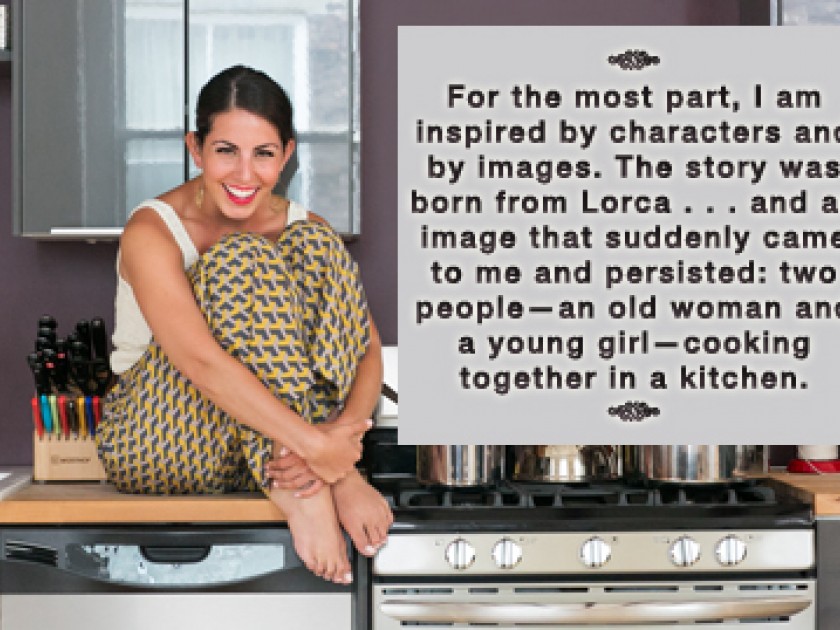
Jessica Soffer’s debut novel, Tomorrow There Will Be Apricots, was published by Houghton Mifflin Harcourt in April 2013.
Penny Metsch: Every aspect of your story is so timely, yet so enduring. Issues of immigration, parenting, teenage angst, and food, wonderful, beautifully prepared food, are with us every day. Yet, you have given us a fresh view of it all. The characters are each compelling in his or her own right, but also inter-woven like a precious rug. How did it all come together?
Jessica Soffer: That’s a really generous way of describing the book. Thank you so much. I didn’t think too terribly much about those concepts while writing. For the most part, I am inspired by characters and by images. The story was born from Lorca (a teenage pain addict, whom I’d written a story about while I was in graduate school) and an image that suddenly came to me and persisted: two people — an old woman and a young girl — cooking together in a kitchen. What grew out of that, around that, was a way of situating those elements.
PGM: Victoria and Joseph are Iraqi Jews. Their immigration journey has a very personal connection to your family’s history. Would you elaborate?
JS: My father was an Iraqi Jew who came to the United States at roughly the same time that Victoria and Joseph (two characters in Apricots) did. At one time, and for a very long time, the Jews in Baghdad flourished. They were the sophisticates, the intellectuals, a huge and important part of the political and cultural landscape. But after the Brits left Iraq in 1942, there was turmoil and instability — and the Nazis took advantage of that. Everything changed. In the late 1940s and early 1950s, 120,000 out of 135,000 Jews fled. First, before 1947, legally and safely. After, they were given the option to leave everything — their passports, belongings, everything — and be airlifted to Israel. Most did. My father didn’t. He went through Iran, into hiding, and eventually was given false papers, which enabled him to travel to Ellis Island.
PGM: I think I will remember Lorca for as long as I read. Her yearning for love and her self-mutilating response at rejection is heart wrenching. Did you ever know anyone like her?
JS: What a lovely thing to say. Thank you again. I knew some cutters growing up, but no one intimately. I was never present when they cut, nor was I ever in a position to intervene, which I am grateful for. But self-harm is an epidemic and one that has always interested me. In a lot of ways it’s the opposite of escapism. It’s an attempt to feel, to inhabit one’s body, the world, more. And feeling more is at the heart of what good writing should do, force us to inhabit another person’s life, another world.
PGM: As the characters orbit around each other, near, but not yet connecting, food is the magnet that brings them together. Has food, particularly Middle Eastern flavors, always been an integral part of your awareness?
JS: In a way, yes. We spent the High Holy Days at my father’s sister’s house, eating the food of my father’s childhood. Those memories feel very close to me. But I didn’t want food to simply be a positive, nostalgic force in the novel. Lorca, the teenage pain addict, is desperate for her mother’s attention — and her mother is a chef. It’s with food that she tries to win her over and it’s with food that she fails, again and again, to do just that. Food, in Apricots, is as much magnet, as you say, as it is a tool: a way of engaging with the world, of coping, of surviving. And that’s what interests me: the unique ways that we find to live — to cut, to cook, to cry.
PGM: Has the role of Judaism in your life influenced the story in any way?
JS: Where food is concerned: yes. I grew up with two very distinct versions of Jewish cooking. On my father’s side, there are the heavily-spiced, warm, orange flavors. Lots of stews, lots of cardamom, lots of nurturing the body through what one puts in it. On my mother’s side, there’s the Brooklyn version of Jewish cuisine: smoked fish, bagels, matzah brei, horseradish. My mother’s father used to love nothing more than Katz’s, which appalled my father. We didn’t go to temple, and I wasn’t bat mitzvahed. So, for now, food is how I access my Jewishness, how I comprehend it, reference it, honor it in my writing and otherwise.
PGM: A first novel is such an exciting event. Have you always written and seen this on the horizon?
JS: I keep having to remind myself to be excited. I’m mostly just nervous and itchy and distracted. It seems idiotic, but I really didn’t think about this part: the part where people would have opinions about it. Or at least, I forgot about it for some time. I think you have to in order to write freely. The kind of anxiety I’m feeling at the moment would have done nothing good for the writing.
PGM: And, finally, the title, Tomorrow There Will Be Apricots, refers to an Arabic saying. Does it give away too much of the story to tell why you chose this?
JS: Apricot season is typically short and fickle. The idiom suggests that things will turn up as much as the opposite. What’s at the heart of Apricots is the hope for joy, the reality of sadness, and the delicate balance between the two: how we must learn to live there.